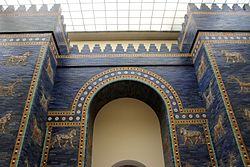| Geographical range | Mesopotamia |
|---|---|
| Period | Stone Age |
| Dates | c. 10000 – c. 3300 BCE |
| Major sites | |
| Preceded by | Epipalaeolithic |
| Followed by | Bronze Age Iraq |
| History of Iraq |
|---|
 |
|
|
Neolithic Iraq is an archaeological term used to refer to the Neolithic stage of prehistoric Mesopotamia (Iraq). Mesopotamia was inhabited by several distinct, flourishing cultures in between the end of the Last Glacial Period (c. 14000 – c. 6500 BCE) and beginning of the Copper Age (c. 5000 – c. 4500 BCE). Archaeological sites such as those of the Samarran and Halafian cultures were centered at central and upper Mesopotamia (central and northern Iraq); settlements of the Ubaidians' in lower Mesopotamia (southern Iraq) required complicated irrigation methods. It appears that the archaeological culture of the Ubaidians' may have been derived from that of the Samarrans'. The first among these Lower Mesopotamian settlements were tells el-'Oueili, al-'Ubaid, and Abu Shahrain.
Dating, periodization, and extent
editPeriodization, chronology, and timeline
editPeriodization and chronology
edit| Century BCE | Age | Stage | Period | Phase | Style | Level (Eridu/Eabzu) | Level (Uruk/Eanna) |
|---|---|---|---|---|---|---|---|
| 100th | Pre-Pottery Neolithic (PPN) | PPNA | 1 | ||||
| 99th | |||||||
| 98th | |||||||
| 97th | |||||||
| 96th | |||||||
| 95th | 2 | ||||||
| 94th | |||||||
| 93rd | |||||||
| 92nd | |||||||
| 91st | |||||||
| 90th | |||||||
| 89th | |||||||
| 88th | Early PPNB | 3 | |||||
| 87th | |||||||
| 86th | |||||||
| 85th | |||||||
| 84th | |||||||
| 83rd | Middle PPNB | ||||||
| 82nd | |||||||
| 81st | |||||||
| 80th | |||||||
| 79th | |||||||
| 78th | |||||||
| 77th | |||||||
| 76th | |||||||
| 75th | Late PPNB | 4 | |||||
| 74th | |||||||
| 73rd | |||||||
| 72nd | |||||||
| 71st | |||||||
| 70th | |||||||
| 69th | |||||||
| 68th | |||||||
| 67th | |||||||
| 66th | |||||||
| 65th | PPNC | 5 | Ubaid 0 | Oueili | |||
| 64th | Pottery Neolithic (PN) | PNA | 6 | ||||
| 63rd | |||||||
| 62nd | |||||||
| 61st | |||||||
| 60th | |||||||
| 59th | |||||||
| 58th | |||||||
| 57th | |||||||
| 56th | |||||||
| 55th | Early Ubaid | Eridu | XVIII | ||||
| 54th | XVIII | ||||||
| 53rd | XVII | ||||||
| 52nd | XV | ||||||
| 51st | XIV | ||||||
| 50th | Early Chalcolithic | XIII | XIX | ||||
| 49th | XII | ||||||
| 48th | 7 | Hadji Muhammed | XI | ||||
| PNB | 8 | Tell al‐Ubaid | |||||
| 47th | 9 | Late Ubaid | X | XVIII | |||
| 46th | |||||||
| 45th | Late Chalcolithic (LC) | LC 1 | IX | ||||
| 44th | |||||||
| 43rd | VIII | ||||||
| 42nd | LC 2 | Terminal Ubaid | Ubaid V | VII | XVII | ||
| XVI | |||||||
| 41st | XV | ||||||
| XIV | |||||||
| XIII | |||||||
| 40th | VI | XII | |||||
| XI | |||||||
| 39th | X | ||||||
| 38th | LC 3 | V | IX | ||||
Timeline
edit
Schematic outline of contemporaneous cultures
edit| Century BCE | Upper Mesopotamia | Central Mesopotamia | Lower Mesopotamia | ||||||
|---|---|---|---|---|---|---|---|---|---|
| Erbil | Nineveh | Saladin | Diyala | Sulaymaniyah | Babylon | Muthanna | Qadisiyah | Dhi Qar | |
| 65th | Ubaid 0 style | ||||||||
| 64th | |||||||||
| 63rd | Hassuna culture | Samarra culture | |||||||
| 62nd | |||||||||
| 61st | |||||||||
| 60th | Samarra culture | ||||||||
| 59th | |||||||||
| 58th | |||||||||
| 57th | |||||||||
| 56th | |||||||||
| 55th | |||||||||
| 54th | Halaf culture | Ubaid 1 style | |||||||
| 53rd | Halaf culture | Ubaid 1 style | |||||||
| 52nd | Halaf-Ubaid Transitional period | ||||||||
| 51st | |||||||||
| 50th | Ubaid 1 style | ||||||||
| 49th | |||||||||
| 48th | Ubaid 2 style | ||||||||
| 47th | Ubaid 2 style | ||||||||
| 46th | Ubaid 3 style | ||||||||
| 45th | Ubaid 4 style | ||||||||
| 44th | |||||||||
| 43rd | Late Chalcolithic | ||||||||
| 42nd | Ubaid 5 style | ||||||||
| 41st | |||||||||
| 40th | |||||||||
| 39th | |||||||||
Locations of sites, environment, and climate
editSites
editBiota
editEnvironment
editClimate
editEstimated settlement sizes and populations
editMap
editTechnology
editAgriculture, domestication, and hunting
editFauna and flora
editFauna
editWildlife
edit| Common name | Binomial name |
|---|---|
| Saudi gazelle | Gazella saudiya |
| Persian fallow deer | Dama mesopotamica |
| Syrian wild ass | Equus hemionus hemippus |
| Eurasian wild pig | Sus scrofa |
| Wild goat | Capra aegagrus |
Livestock
edit| Common name | Binomial name |
|---|---|
| Domestic goat | Capra hircus |
| Arabi sheep | Ovis aries |
| Cattle | Bos taurus |
| Domestic pig | Sus domesticus |
| Saluki | Canis familiaris |
Flora
editCrops
edit| Common name | Binomial name |
|---|---|
| Two-rowed barley | Hordeum distichon |
| Naked six-rowed barley | Hordeum vulgare |
| Emmer wheat | Triticum turgidum |
| Einkorn wheat | Triticum monococcum |
| Lentil | Lens culinaris |
| Chickpea | Cicer arietinum |
| Date | Phoenix dactylifera |
Structures, tools, utensils, and weapons
edit| Tool | Image |
|---|---|
| Sickle | |
| Kiln |
